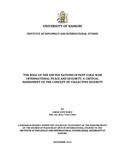| dc.contributor.author | Boru, Jarso G | |
| dc.date.accessioned | 2013-11-25T12:32:32Z | |
| dc.date.available | 2013-11-25T12:32:32Z | |
| dc.date.issued | 2013-11 | |
| dc.identifier.citation | Degree of masters of Arts in international studies | en |
| dc.identifier.uri | http://erepository.uonbi.ac.ke:8080/xmlui/handle/123456789/60051 | |
| dc.description | A research project submitted in partial fulfillment of the requirements
Of the degree of masters of Arts in international studies to the
Institute of diplomacy and international studies (IDIS), university of
Nairobi. | en |
| dc.description.abstract | This study will provide an overview of the role of the United Nations collective security system in
post cold war international peace and security. This entails critical assessment of the underlying
concept of collective security, and evaluation of the challenges and achievements of the system.
The research will use a conceptual framework of collective security paradigm in analysing the
problem. The central idea in this concept is that the cooperation of the states is sustained on the
notion of ‘one for all and all for one’-that an aggressor will be stopped by the superior force, that
will come from the amalgamation of states powers. The study establishes that the creation of the
universal collective security arrangement was not a panacea to the global security problem as
expected. Rather the spirit of ‘one for all and all for one’ as professed by the proponents did not
actualize, but instead states became more atomistic and egocentric in their approach to universal
obligations. This situation rendered the United Nations collective security unable to effectively
respond to international peace problems. The study obtained relevant data from primary and
secondary sources to try and understand the problem. The data collection method applied was
mainly desk study, library research; Internet based research, and participation in some relevant
seminars. Data was also acquired from various primary sources through participation in various
meetings of policy nature, and intergovernmental negotiation forums. | en |
| dc.language.iso | en | en |
| dc.publisher | University of Nairobi | en |
| dc.title | The Role of the United Nations in Post-cold War International Peace and Security: a Critical Assessment of the Concept of Collective Security | en |
| dc.type | Thesis | en |
| local.publisher | Institute of Diplomacy and International Studies | en |

